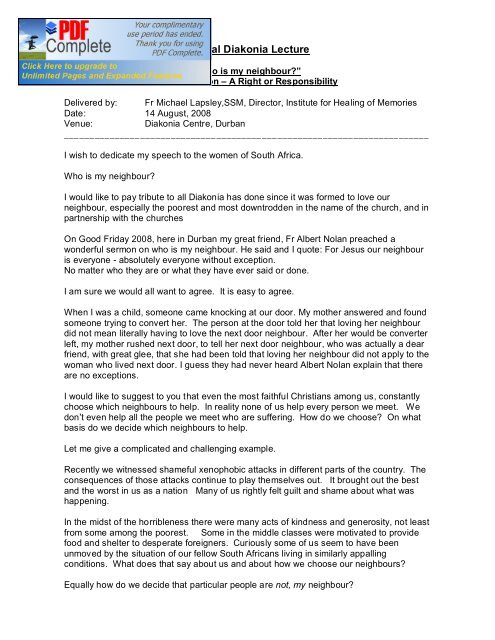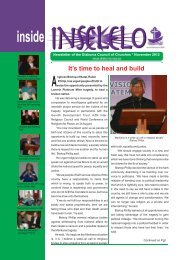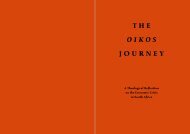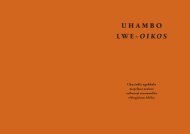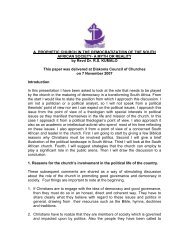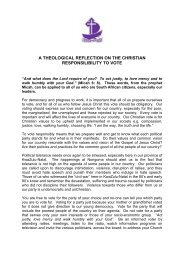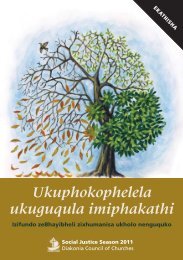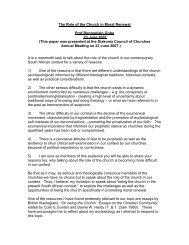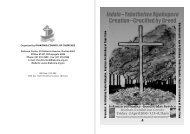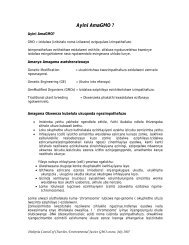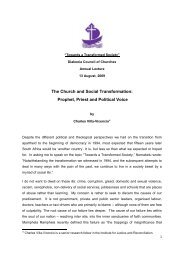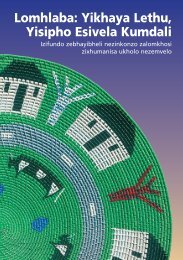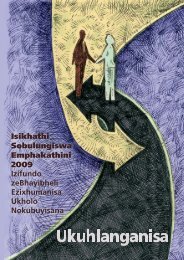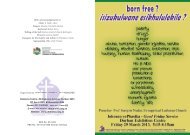Annual Diakonia Lecture - Diakonia Council of Churches
Annual Diakonia Lecture - Diakonia Council of Churches
Annual Diakonia Lecture - Diakonia Council of Churches
You also want an ePaper? Increase the reach of your titles
YUMPU automatically turns print PDFs into web optimized ePapers that Google loves.
<strong>Annual</strong> <strong>Diakonia</strong> <strong>Lecture</strong><br />
“Who is my neighbour?”<br />
Reconciliation – A Right or Responsibility<br />
Delivered by: Fr Michael Lapsley,SSM, Director, Institute for Healing <strong>of</strong> Memories<br />
Date: 14 August, 2008<br />
Venue:<br />
<strong>Diakonia</strong> Centre, Durban<br />
________________________________________________________________________<br />
I wish to dedicate my speech to the women <strong>of</strong> South Africa.<br />
Who is my neighbour?<br />
I would like to pay tribute to all <strong>Diakonia</strong> has done since it was formed to love our<br />
neighbour, especially the poorest and most downtrodden in the name <strong>of</strong> the church, and in<br />
partnership with the churches<br />
On Good Friday 2008, here in Durban my great friend, Fr Albert Nolan preached a<br />
wonderful sermon on who is my neighbour. He said and I quote: For Jesus our neighbour<br />
is everyone - absolutely everyone without exception.<br />
No matter who they are or what they have ever said or done.<br />
I am sure we would all want to agree. It is easy to agree.<br />
When I was a child, someone came knocking at our door. My mother answered and found<br />
someone trying to convert her. The person at the door told her that loving her neighbour<br />
did not mean literally having to love the next door neighbour. After her would be converter<br />
left, my mother rushed next door, to tell her next door neighbour, who was actually a dear<br />
friend, with great glee, that she had been told that loving her neighbour did not apply to the<br />
woman who lived next door. I guess they had never heard Albert Nolan explain that there<br />
are no exceptions.<br />
I would like to suggest to you that even the most faithful Christians among us, constantly<br />
choose which neighbours to help. In reality none <strong>of</strong> us help every person we meet. We<br />
dont even help all the people we meet who are suffering. How do we choose? On what<br />
basis do we decide which neighbours to help.<br />
Let me give a complicated and challenging example.<br />
Recently we witnessed shameful xenophobic attacks in different parts <strong>of</strong> the country. The<br />
consequences <strong>of</strong> those attacks continue to play themselves out. It brought out the best<br />
and the worst in us as a nation Many <strong>of</strong> us rightly felt guilt and shame about what was<br />
happening.<br />
In the midst <strong>of</strong> the horribleness there were many acts <strong>of</strong> kindness and generosity, not least<br />
from some among the poorest. Some in the middle classes were motivated to provide<br />
food and shelter to desperate foreigners. Curiously some <strong>of</strong> us seem to have been<br />
unmoved by the situation <strong>of</strong> our fellow South Africans living in similarly appalling<br />
conditions. What does that say about us and about how we choose our neighbours?<br />
Equally how do we decide that particular people are not, my neighbour?
It is now 35 years since my plane touched down in Durban. During that first period in<br />
South Africa I sought as I still seek, to be a follower <strong>of</strong> Jesus Christ. I sought to be<br />
obedient to the divine command to love God with my heart, soul, mind and strength and to<br />
love my neighbour as myself.<br />
I found that under apartheid I could not be a neighbour to a black person. The colour <strong>of</strong><br />
my skin made me an oppressor just as it defined all black people as oppressed. I could<br />
fight against apartheid and I did, but I still had all the advantages <strong>of</strong> a white skin. When I<br />
look back, joining the liberation struggle was for me, about recovering my own humanity,<br />
about dealing with the other, about the possibility <strong>of</strong> becoming neighbours.<br />
Having been a committed pacificist, since early adolescence, I travelled a journey similar<br />
to that <strong>of</strong> the nation. From the perspective <strong>of</strong> those fighting against apartheid, I eventually<br />
became convinced, after the killings during the Soweto uprising, that in our context, the<br />
Augustinian and Thomist arguments for a just war were all fulfilled we had just goals, just<br />
means, it was a last resort to mention just a few <strong>of</strong> the classical arguments. I always<br />
remember an interview with Oliver Tambo about the armed struggle. His voice reduced to<br />
a whisper as he said: They forced us into it. No romanticisation <strong>of</strong> armed struggle and, I<br />
suspect, a spirituality that made him intuitively aware that there would be an enormous<br />
moral and spiritual cost for that option. While others equivocated about necklacing it<br />
was Tambo who used his moral authority to say that it was unacceptable.<br />
We in the faith community, step by step, resolution by resolution, finally faced the fact that<br />
we were ruled over by an illegitimate government. However, even to the very end, the<br />
churches continued <strong>of</strong>ficially to provide military chaplains only to the SADF and never<br />
<strong>of</strong>ficially to the forces for liberation.<br />
Of course it is true to say that as church people, we tended to be better at the orthodoxy <strong>of</strong><br />
our teaching than the orthopraxis. If church resolutions could build the kingdom <strong>of</strong> God,<br />
South Africa would have become heaven on earth a long time ago.<br />
Why do I mention these things today this is 2008 after all.<br />
That was that time. Now is another time.<br />
What time is it now in South Africa?<br />
As the book Ecclesiastes says:<br />
1 For everything there is a season, and a time for every matter under heaven:<br />
2 a time to be born, and a time to die;<br />
a time to plant, and a time to pluck up what is planted;<br />
3 a time to kill, and a time to heal;<br />
a time to break down, and a time to build up;<br />
4 a time to weep, and a time to laugh;<br />
a time to mourn, and a time to dance;<br />
5 a time to throw away stones, and a time to gather stones together;<br />
a time to embrace, and a time to refrain from embracing;<br />
6 a time to seek, and a time to lose;<br />
a time to keep, and a time to throw away;<br />
7 a time to tear, and a time to sew;<br />
a time to keep silence, and a time to speak;
8 a time to love, and a time to hate;<br />
a time for war, and a time for peace.<br />
The Holy Bible : New Rev ised Standard Version. 1996, c1989. Thomas Nelson: Nashville<br />
Some <strong>of</strong> the voices we are now hearing in the political discourse belong to a previous age.<br />
They are out <strong>of</strong> sync. It is not a time for killing, but it is a time for healing. It is not a time for<br />
war, but it is a time for peace. It is not a time to keep silence it is a time to speak.<br />
If we are to have a neighbourly society the time has come for the faith community to come<br />
out <strong>of</strong> early retirement. We used to speak to pharaoh with great clarity. And then Joseph<br />
became pharaoh and we lost our way<br />
It is time for the faith community to find its voice again we need to stand for the truth.as<br />
we did so well in 1989.<br />
As more South Africans become increasingly disenchanted with the behaviour <strong>of</strong> the<br />
political class, there is a space which we in the faith community along with civil society can<br />
and should occupy. Are we ready, are we willing?<br />
What is the truth for which we must stand it is the truth <strong>of</strong> the gospel <strong>of</strong> Jesus Christ - the<br />
truth <strong>of</strong> a partial and partisan God who is in favour <strong>of</strong> everybody from the side <strong>of</strong> the poor<br />
and oppressed.<br />
In the wake <strong>of</strong> the democratic elections <strong>of</strong> 1994, the churches began to use the term<br />
critical solidarity in relation to a legitimate and democratically elected Government.<br />
We should be fearless in supporting government when it acts in the interests <strong>of</strong> the poor.<br />
We should be equally fearless in opposing government when it fails to act justly.<br />
Here in the province where Mahatma Gandhi walked it is good to assert the need for<br />
satyagraha and a spirit <strong>of</strong> compassion.<br />
The recent attacks on the judiciary should alarm all <strong>of</strong> us. Our grandchildren might not<br />
forgive us if we stood idly by and allowed the rule <strong>of</strong> law and a respected and<br />
independent judiciary to be compromised for short term political gains by the loudest<br />
voices in the political class.<br />
When we think about who is our neighbour as South Africans we cannot fail to think about<br />
Zimbabwe. In the early years <strong>of</strong> this millennium we failed Zimbabwe. During our liberation<br />
struggle we did everything in our power to make sure that the issue <strong>of</strong> apartheid was on<br />
everyone's agenda. As a country, during the last decade we used our power whenever we<br />
could to protect and shelter the government <strong>of</strong> Zimbabwe as it systematically violated the<br />
rights <strong>of</strong> its own people. This will not be quickly forgotten by Zimbabweans.<br />
We can be proud <strong>of</strong> the prophetic action <strong>of</strong> Bishop Rubin Philip and others to seek to<br />
prevent Chinese arms being sent to Zimbabwe.<br />
For years, I pooh-poohed those who made comparisons with Zimbabwe and what South<br />
Africa might become. Today I am less sure, after recent events in our country. Much<br />
depends on you and me.
Allow me to suggest to you that as Christians, we have much to learn from a little island in<br />
the Caribbean called Cuba about what it means to be a neighbour. Although<br />
economically poor, Cuba has expressed practical solidarity across the developing world<br />
not least to us in South Africa during our liberation struggle and since 1994. Fidel rightly<br />
says that solidarity is the opposite <strong>of</strong> xenophobia and racism. There are 5 Cuban patriots<br />
languishing in US prisons because they tried to prevent terrorism against their motherland<br />
I have visited one <strong>of</strong> them, Gerardo Hernandez 4 times in a US jail. When Walter Sisulu<br />
died, Gerardo wrote from his prison cell to express his sadness. Cuba gives a lie to the<br />
expression charity begins at home which is <strong>of</strong>ten used as an argument for not showing<br />
support beyond our immediate circle<br />
In many <strong>of</strong> our churches, not least in my own, debate rages about the place <strong>of</strong> same<br />
gender loving people. Often the debate creates more heat than light<br />
In my experience, whenever there is conflict, there is an us and a them. In the<br />
Gospels Jesus told stories that encouraged listeners to see that we are one human family.<br />
In the faith community, not least in my own church, homosexuality has been an issue that<br />
has caused sharp divisions.<br />
Same gender loving persons become political football in the battle between liberals and<br />
conservatives. Personally I have a dream that in my lifetime, all the leaders <strong>of</strong> the worlds<br />
great religions will make an unequivocal apology to gay, lesbian, and transgendered<br />
people for our part in their oppression and for the hurt we have caused. Many across the<br />
world admire us as a country for the constitutional provision outlawing discrimination on<br />
the basis <strong>of</strong> orientation. That has not stopped the rape <strong>of</strong> black lesbians in our townships..<br />
Are our churches safe places where people can tell their stories and be honest about who<br />
they are?<br />
In our Institute for Healing <strong>of</strong> Memories, we love to say that every story needs a listener..<br />
But it is true isnt it that in all our churches, across the different traditions, we are much<br />
better at preaching than we are at listening to one anothers pain?<br />
The Bible tells us that we should love our neighbours as ourselves. But what happens if<br />
we dont love ourselves? What hope is there <strong>of</strong> loving the other if our experience <strong>of</strong> life<br />
has made us feel worthless? I have long been convinced that the greatest damage that<br />
apartheid did to all the people <strong>of</strong> this country was spiritual damage.<br />
Researchers are helping us to understand that trauma and damage can be<br />
intergenerational. What do I carry inside me as a consequence <strong>of</strong> what happened to my<br />
parents and grandparents and even further back?<br />
On the day Martin Luther King was assassinated he lead a march <strong>of</strong> the sanitation<br />
workers. They were all black men. Each <strong>of</strong> them carried a placard which simply read: I am<br />
a man. 30 years later I participated in a march in New York City and we all carried the<br />
same placard which said: I am somebody.<br />
The words <strong>of</strong> Jesus invite us to be neighbours. To become neighbours we will need to<br />
recognise our own woundedness and the woundedness <strong>of</strong> others to cooperate with God<br />
in Gods own healing work
For Christians, healing and reconciliation are not optional extras. They are integral to the<br />
Christian message. Indeed I would suggest that as a faith community we need to add<br />
healing and reconciliation to the Millennium Development Goals.<br />
Is this work <strong>of</strong> healing and reconciliation something for which we need a new Messiah?<br />
No, we are all, the people God has been waiting for.


